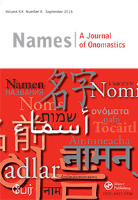
Names-A Journal of Onomastics
Scope & Guideline
Unlocking the Secrets Behind Every Name
Introduction
Aims and Scopes
- Interdisciplinary Research on Naming Practices:
The journal explores names from various disciplinary perspectives, including linguistics, anthropology, and sociology, facilitating a rich understanding of how names function within different cultural and social contexts. - Cultural and Historical Analysis of Names:
Papers often delve into the historical roots and cultural significance of names, examining how they shape identity, community, and personal narratives across different societies. - Methodological Innovations in Onomastics:
The journal encourages the use of diverse methodologies including corpus linguistics, bibliometric analyses, and sociolinguistic approaches, fostering a rigorous exploration of naming practices. - Focus on Place Names and Urban Onomastics:
A significant portion of the research is dedicated to place names (toponyms) and their implications for understanding geographic identity, urban development, and cultural heritage. - Exploration of Personal Names and Identity:
The journal frequently addresses personal names (anthroponyms) and their roles in shaping individual and collective identities, reflecting societal norms and trends.
Trending and Emerging
- Digital Onomastics:
The journal is increasingly featuring studies that explore the impact of digital platforms on naming practices, such as usernames and online identities, highlighting the relevance of names in digital culture. - Names and Identity Politics:
Emerging themes focus on the interplay between names and identity politics, particularly in relation to race, gender, and cultural identity, underscoring how names can serve as markers of social status and personal identity. - Linguistic Analysis of Names in Media and Literature:
There is a growing trend towards analyzing names within media, literature, and popular culture, exploring how these names reflect and influence societal values and trends. - Cross-Cultural Naming Practices:
Research is increasingly examining naming practices across different cultures, with comparative studies that highlight similarities and differences, thereby enriching the understanding of global onomastics. - Impact of Sociolinguistics on Naming Trends:
Studies are emerging that investigate how sociolinguistic factors influence naming trends, particularly in multicultural societies, reflecting broader societal changes and attitudes.
Declining or Waning
- Traditional Onomastic Studies:
There is a noticeable decline in papers focusing solely on traditional onomastic studies that do not integrate contemporary socio-cultural contexts. This shift may indicate a movement towards more applied studies that connect names to current social issues. - Static Historical Analyses:
Research that strictly adheres to historical analyses of names without considering modern implications or interdisciplinary approaches is becoming less frequent, suggesting a trend towards dynamic analyses that engage with present-day contexts. - Narrowly Focused Regional Studies:
Papers concentrating exclusively on localized naming practices without broader implications or connections to global trends are diminishing, reflecting a growing interest in comparative and global perspectives in onomastics.
Similar Journals

NEUPHILOLOGISCHE MITTEILUNGEN
Navigating the Intricacies of Philology and Linguistic StudiesNEUPHILOLOGISCHE MITTEILUNGEN, published by the esteemed Modern Language Society, stands as a significant contribution to the domain of Language and Linguistics. With a history dating back to 1971, this journal has consistently provided an academic platform for researchers and scholars, navigating through the intricacies of philology and linguistic studies. Although it is indexed in Scopus with rankings reflecting its position in the Arts and Humanities and Social Sciences categories, it currently does not offer Open Access, which may require interested parties to seek institutional access for its wealth of content. The journal has experienced periods of coverage discontinuation in recent years, yet it remains a valued source for advancing the understanding of language theories and linguistic practices. Its location in Helsinki, Finland, offers a unique European perspective on global linguistic issues. The journal is ideal for those looking to engage with evolving linguistic trends and contribute to contemporary discussions in the field.

Voprosy Yazykoznaniya
Exploring the Depths of Linguistic InsightVoprosy Yazykoznaniya, published by the esteemed Russian Academy of Sciences and the State Academy of Humanities (GAUGN), stands as a leading journal in the field of linguistics and language studies. With an impressive Q2 rank in Linguistics and Language for 2023 and a strong position within Scopus rankings, this journal fosters scholarly dialogue and pushes the boundaries of linguistic research by providing a platform for innovative studies, reviews, and analyses. Although not open access, its publication ensures high academic standards and visibility within the global academic community. Researchers, professionals, and students alike can benefit from the rich insights and diverse perspectives presented in this journal, serving as a vital resource for anyone interested in the intricacies of language and its role in society. Operating since 2009 and continuing to 2024, Voprosy Yazykoznaniya is an essential reference point for contemporary linguistic scholarship in the Russian Federation and beyond.

Fluminensia
Advancing Knowledge Through Open Access ScholarshipFluminensia, published by the University of Rijeka, Faculty of Philosophy, is a distinguished open-access journal that has been contributing to the fields of Linguistics and Literature since its inception in 1999. With an ISSN of 0353-4642 and an E-ISSN of 1848-9680, this journal offers rigorous peer-reviewed articles, fostering an engaging platform for researchers, professionals, and students alike. Recognized internationally, it holds a Q3 ranking in Linguistics and Language and a Q2 ranking in Literature and Literary Theory for 2023, reflecting its significant impact within these fields. Based in Croatia and serving a global academic community, Fluminensia aims to explore innovative theories and methodologies, promoting critical discourse and scholarly exchange. Researchers will find its broad scope inviting, bridging insights across various disciplines in the arts and humanities. Accessible to all, this journal continues to foster an inclusive academic landscape, ensuring that valuable research is widely disseminated and freely available.

Linguistica e Filologia
Nurturing Interdisciplinary Perspectives in Language Studies.Linguistica e Filologia is a prominent academic journal published by UNIV DEGLI STUDI BERGAMO that offers an Open Access platform since 2002, fostering scholarly communication in the fields of linguistics, philology, and comparative literature. With a commitment to advancing understanding in these disciplines, the journal serves as a vital resource for researchers, professionals, and students alike. Its content encompasses diverse theoretical and empirical studies, critiques, and analyses of language and literature, encouraging interdisciplinary dialogue. Hosted in the picturesque city of Bergamo, Italy, the journal aims to bridge gaps between historical and contemporary linguistic practices, enhancing the global discourse on language studies. With a focus on quality, transparency, and accessibility, Linguistica e Filologia plays a crucial role in shaping the future of linguistic scholarship and is an invaluable reference for anyone interested in the intricate relationships between language and culture.
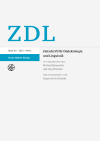
ZEITSCHRIFT FUR DIALEKTOLOGIE UND LINGUISTIK
Bridging Cultures Through Language Insights.ZEITSCHRIFT FUR DIALEKTOLOGIE UND LINGUISTIK, published by FRANZ STEINER VERLAG GMBH, is a distinguished academic journal based in Germany that occupies a vital place in the field of linguistics and dialectology. With an ISSN of 0044-1449 and an E-ISSN of 2366-2395, this journal has evolved significantly from 2003 to 2024. It is recognized in the 2023 Journal Rankings as Q2 in Linguistics and Language, and Q3 in Sociology and Political Science, reflecting its dual focus and interdisciplinary approach. Academics will appreciate its commitment to exploring the nuances of language and its social implications, as evidenced by its respectable Scopus rankings, placing it in the 61st and 57th percentiles for Language and Linguistics, and Sociology respectively. While the journal is not open access, it remains a critical resource for researchers, professionals, and students seeking to deepen their understanding of dialectal variations and their cultural contexts. Positioned to foster ongoing dialogue and inquiry, ZEITSCHRIFT FUR DIALEKTOLOGIE UND LINGUISTIK continues to be an indispensable outlet for scholarly work in these interdisciplinary fields.
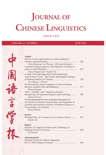
JOURNAL OF CHINESE LINGUISTICS
Cultivating Knowledge in the Realm of Chinese LinguisticsJOURNAL OF CHINESE LINGUISTICS, published by the JOURNAL CHINESE LINGUISTICS, is a prominent periodical that serves as a vital resource for researchers and scholars in the fields of linguistics and Chinese studies. With its ISSN 0091-3723, this journal has been contributing to the academic community since 1996 and continues to publish innovative research until 2024. Although it is classified in the third quartile (Q3) for both Arts and Humanities and Linguistics categories, its focus on Chinese linguistics positions it uniquely within this specialized domain. The journal is committed to advancing the understanding of Chinese language structures, usage, and context, encouraging interdisciplinary dialogue among linguists and language researchers. While currently not labeled as open access, the journal remains accessible to institutions and scholars worldwide, creating an invaluable platform for disseminating knowledge. As such, it plays a critical role in promoting linguistic diversity and cultural awareness within the academic landscape.
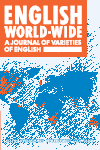
English World-Wide
Unveiling the Richness of English Across ContinentsEnglish World-Wide, published by John Benjamins Publishing Co., is a premier journal in the field of linguistics and language studies, reflecting the rich diversity of English across global contexts. With an ISSN of 0172-8865 and an E-ISSN of 1569-9730, this journal has established itself as a valuable resource since its inception in 1980. It holds an impressive Q2 rank in the 2023 category for Linguistics and Language, and ranks #222 among 1,088 journals in Arts and Humanities related to Language and Linguistics, indicating its significant role in advancing scholarly discussions. Operating from its base in the Netherlands, the journal covers a comprehensive scope that not only includes theoretical approaches but also applied studies addressing the sociocultural variations of the English language worldwide. While it does not provide open access, its content is meticulously curated to cater to both researchers and practitioners looking to deepen their understanding of English linguistics. The journal's dedication to high-quality research makes it an essential platform for anyone interested in the dynamic field of language and communication.
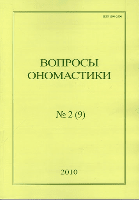
Voprosy Onomastiki-Problems of Onomastics
Pioneering Research in Onomastics and BeyondVoprosy Onomastiki-Problems of Onomastics is a distinguished open-access journal published by URAL FEDERAL UNIVERSITY that has been at the forefront of onomastic studies since its inception. With a dedicated ISSN of 1994-2400 and E-ISSN 1994-2451, the journal serves as a critical platform for researchers and practitioners engaged in the fields of linguistics, communication, and sociolinguistics, particularly in analyzing the significance of names and their impact on culture and society. As of 2023, it proudly holds a Q3 ranking in Communication and a Q2 ranking in Linguistics and Language, highlighting its vital role in advancing scholarly discourse. The journal's Scopus rankings further underscore its relevance within the arts and humanities, positioning it as an essential resource for academics keen on exploring the intersections of language, identity, and society. With open access since 2014, Voprosy Onomastiki ensures that its valuable content is readily available to a global audience, thereby fostering a rich exchange of ideas and findings in onomastics.

Studia Semiotyczne
Exploring the Depths of Meaning and CommunicationStudia Semiotyczne is a prominent academic journal dedicated to the interdisciplinary study of semiotics, linguistics, and philosophy, published by the esteemed Polskie Towarzystwo Semiotyczne. With its ISSN 0137-6608 and E-ISSN 2544-073X, this journal has established itself as an essential platform for scholars in these fields. Since transitioning to Open Access in 2010, Studia Semiotyczne provides unrestricted access to groundbreaking research, thereby fostering scholarly exchange and collaboration globally. The journal has been recognized in the Q2 category in both Linguistics and Language and Philosophy in 2023, reflecting its quality and impact in these disciplines. By covering a range of topics within semiotics and related studies, it aims to advance understanding and stimulate dialogue among researchers and practitioners alike, making it an indispensable resource for those seeking to explore the complexities of meaning and communication in contemporary society.

FRENCH REVIEW
Navigating the Rich Tapestry of French Academic InquiryFRENCH REVIEW, published by Johns Hopkins University Press, is a premier journal in the fields of Cultural Studies, Education, Linguistics and Language, and Literature and Literary Theory. With its ISSN 0016-111X and E-ISSN 2329-7131, this journal serves as a vital resource for scholars and practitioners seeking to engage with contemporary topics through rigorous academic discourse. The journal has made notable strides in its impact factor, ranking in the third quartile for Cultural Studies and Linguistics, as well as the second quartile for Literature. While it currently does not offer open access, FRENCH REVIEW remains committed to fostering critical analysis and interdisciplinary approaches, effectively contributing to the advancement of research and understanding in its respective fields. With its converged years spanning from 2002 to 2024, this journal is an essential platform for exchanging ideas and enhancing knowledge in the vibrant landscape of French studies and beyond.